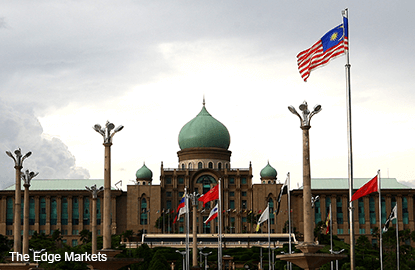
KUALA LUMPUR (May 23): The Gas Supply (Amendment) Bill 2016, which includes a new section that empowers the minister in charge of petroleum matters to approve licences for the regasification or distribution of gas and the transportation of gas, was passed in the Dewan Rakyat today.
With the inclusion of the section, Energy Commission may only grant a licence for the regasification or distribution of gas with the approval of the minister.
It may also only grant a licence for the transportation of gas to a person designated by the minister.
Minister in the Prime Minister's Department Datuk Abdul Wahid Omar said the granting of the licences will be determined by the minister because it involved high cost assets and could not be given to any company.
"Although this power lies in the hand of the minister, the procedure is still carried out by the Energy Commission," Abdul Wahid told the Dewan Rakyat.
PKR parliamentarian Wong Chen earlier raised the question as to why the minister is being given such huge powers to approve the licences.
He noted that the existing Gas Supply Act 1993, the Energy Commission, which is a unit under the Energy, Green Technology and Water Ministry, has full powers in the granting of the licences.
Petroleum affairs come under the Prime Minister's Department, and Wong claims that the minister mentioned in the Bill is the prime minister.
Speaking at a press conference later, the Kelana Jaya lawmaker said the gas industry is a multibillion industry and it is wrong to grant vast powers to one person.
He pointed out that the explanatory note to the Bill has confirmed the worst fears of the opposition that the licence will create a monopoly for the licence holder.
"This Bill is contrary to corporate governance and is obviously anti-competition. These amendments will effectively legalise crony capitalism and allow for the Ali-Baba practices to continue legally," Wong said.
According to the explanatory note, the amendments were aimed at ensuring that only reliable business entities get to participate in the gas market.
It noted that the minister will only approve licences involving high cost infrastructure such as regasification terminal, transmission and distribution pipelines. For other activities such as imports into regasification terminal, shipping, retail and use of gas, the Energy Commission on its own may issue the licences due to the large number of licences, which do not involve high cost of assets and are renewable on annual basis.
"Further the proposed amendment will empower the minister to designate a person to be granted a transportation licence with monopoly status for a specific area of gas supply," the note read.
The Bill also allows for the licence to be transferred, assigned, sub-assigned or disposed of only with the written consent of the minister.
Abdul Wahid said this is to ensure that if a licence holder has been made a bankrupt, the minister can transfer the licence to another person to ensure there is no disruption in gas supply.
He also said the period of the licence is still under the study and consideration of the government.
"For the licence of gas importation to terminal for regasification, a five-year period is proposed, for the licence of regasification or distribution and transportation of gas 20 years, for the licence for retail and shipping 10 years, and for licence for personal use one year," he added.
On the opposition's argument that the amendment is anti-competition, Abdul Wahid said the new Bill was an improvement over the existing law, as it would give third party access to the existing supply chain and thereby create competition.
Abdul Wahid highlighted that with the enforcement of the Bill, the price of gas will no longer be controlled by the government, but by the market.
"Under the third party access framework, the sale and purchase agreement between the supplier and consumer is subjected to the realised market price and the government cannot impose any surcharge when a shortage of gas supply happens. This is because the government can no longer be involved in deciding the price of gas," he added.
The minister added that Malaysia's gas reserves as at end-2015 amounted to 16.7 billion barrels of oil equivalence, which can last the country for 45 years. Oil reserves, meanwhile, amounted to 5.9 billion barrels of oil equivalence and can last the country for another 25 years.